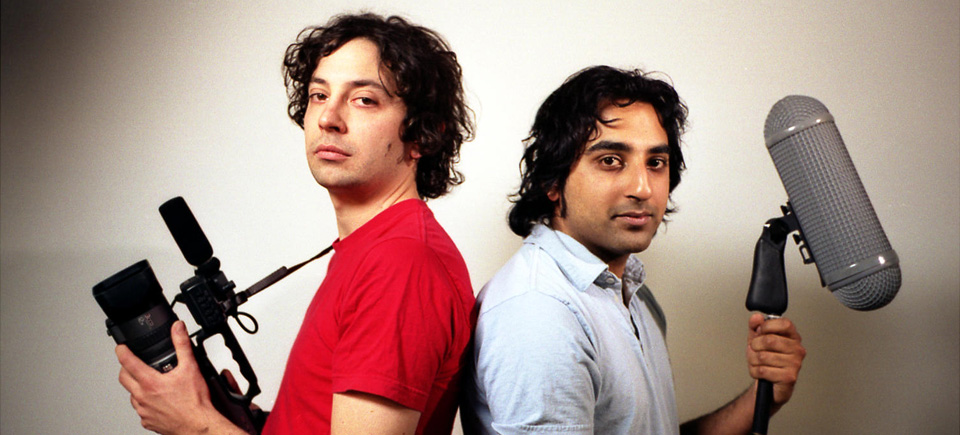
TIFF 2014: Michael Moore’s 13-Point Manifesto for Documentary Filmmaking
TIFF 2014: Michael Moore’s 13-Point Manifesto for Documentary Filmmaking
Here we are, readers, reporting live from the Toronto International Film Festival’s 2014 Doc Conference! Every year, movers and shakers in the documentary industry get together to talk distribution, content, artistry, form, new platforms, trends, and the overall directions in which non-fiction film and video are going.
Michael Moore: Kicking off the Doc Conference with a bang
This morning’s opening keynote speech was delivered by none other than Oscar®-winning and globally-acclaimed documentary filmmaker Michael Moore. Read on for a summary of Moore’s pretty fascinating remarks, as well as his 13-point Manifesto for Documentary Filmmaking (an absolute must-read for creators in non-fiction storytelling).
Moore was a delight to listen to: he was colourful, engaging, hilarious, and quite frankly, full of foul language! (I’ve redacted some of his word choices here; you can use your imagination.)
Moore began by wryly observing that portable, cheap recording technology like cell phone cameras is both “one of the worst things and one of the best things that has happened.” Sure, this development has taken the technology out of the hands of people who have money and power, but, “on the other hand, not everybody should make a movie… we all have different talents.” Moore began to move toward the question on every documentary-maker’s mind: what makes a good doc? Or, perhaps more importantly: what makes a doc so good that lots of people want to pay twelve-odd bucks at the movie theatre to see it?
“I didn’t like documentaries, and that was part of my problem [when starting out]”, Moore admitted. “They were usually nature films or some kind of propaganda: don’t smoke reefer, don’t have sex, don’t drive your car off a cliff.” That’s what documentary films were for most of the 20th century. But Moore is nothing if not adventurous, and he went on to champion all kinds of storytelling and the mystique and adventure that is film-going.
Want to know what kind of stuffy, “traditional” documentary filmmaking Moore was talking about so derisively? Check out Shameless Propaganda, a funny, disturbing, and thought-provoking film about the WWII-era propaganda the NFB produced.
Shameless Propaganda, Robert Lower, provided by the National Film Board of Canada
“I think Borat is a documentary!”
But suddenly, the invention of the shoulder mount “allowed people like me to run from the police [while carrying a camera],” and changed documentary forever. Moore observed that many filmmakers and funders only wanted to replicate the success of his own films, “but I’m up for anything; I think Borat is a documentary! Everything in that film was as they filmed it! None of those people were given a script! That’s what I call a documentary.”
Moore then clarified that he was here with us to discuss feature-length theatrical documentary. “I love doing TV, it’s a great way to reach people,” he says, “but I want to see these films on the big screen, in the dark, with 200 strangers. I think it has a much stronger impact than at home on your computer or iPhone.”
But then it was time for the big question: how has Moore had such wonderful box-office results with his theatrical docs? “I’m shocked that people aren’t doing it the way that I’ve done it,” says Moore. And how exactly is that? “It’s very rare that I see a doc with humour in it. [You have to] allow wit or satire or irony. It’s such a great way to reach out to the average audience because people like to laugh.”
And how do you make people laugh? “To make documentaries, you should have to be able to write,” says Moore. “I don’t mean be a professional writer, I mean you should have the ability to tell a story, with a beginning, middle, and end. You have to respect the audience.”
Michael Moore’s 13-Point Manifesto for Documentary Filmmaking
1. “Laughter is a way to alleviate the pain of what you know to be true. Don’t make a documentary; make a movie,” emphasized Moore in a stern tone. “You’ve chosen this artform: the cinema!” He pointed out that if you wanted to make a speech or give a sermon or give a lecture, you could be a teacher, a politician, etc. “I am here today to declare the word documentarian dead. We are filmmakers. Scorsese does not call himself “fictionetarian”; why do we do that?” People don’t want to be lectured, they want to be entertained, he points out. “You have to put the art first; the politics are secondary. Because if I make a [bad] film, my politics are not going to get through to anybody. If I have not respected the concept of cinema, nobody is going to hear a damn word about my politics.”
Think Moore would be into our satirical doc about colonization, Qallunaat: Why White People are Funny?
Qallunaat! Why White People Are Funny , Mark Sandiford, provided by the National Film Board of Canada
2. “Don’t tell me [stuff] I already know. Don’t tell me that nuclear power is bad, I know it’s bad. Yes, there are a lot of stone-cold idiots in America, but that also means there are many who aren’t stupid and who have a brain. Give them some new information.”
3. The modern documentary has morphed into a college lecture. Moore asserts that college lectures and assignments make students regurgitate an idea that someone else has already ‘discovered’. What’s the point of that, he asks? We need to encourage audiences to find stuff out for themselves, to engage themselves in the discovery of new ideas.
4. “Too many documentaries feel like medicine. People in the movie theatre have just spent a lot of money: nine dollar popcorn!” yelled Moore in outrage. Nine dollar popcorn indeed, Mike. “When in doubt, cut me out,” says a sign in Moore’s workspace.
5. “The left is boring. We lost our sense of humour. We used to be funny! The left was funny during the ‘60s!” Moore claims the political left needs to regain some of that self-aware humour and taste for the funny if they are to make the messages in documentaries heard by a wider audience.
6. “Go after the real villains. Why aren’t you naming names?” Moore is a member of the Academy of Television Arts and Sciences, and he sits on the Oscar jury for Best Documentary. Commenting on the nature of the short list each year, he observed that “there are usually only 2 or 3 docs where the subject matter is about something in the present, something in the US, and something that is political. People say, ‘but I’ll get sued’ [if I name names]… yes, you’ll get sued!” Yikes!
7. “Make your films personal,” says the man who, of course, appears on camera for extended periods of time in each of his acclaimed docs. “You don’t necessarily have to go in front of the camera,” he assures, “but people want to hear the voice [behind the film].” He mentions Morgan Spurlock, Bill Maher, and Al Gore.
Think Moore would be into Sarah Polley’s highly personal tale of the family secrets buried in her past, Stories We Tell? If you haven’t seen the film, check out the trailer here (and you can download the film or buy it on DVD).
Stories We Tell (Trailer), Sarah Polley, provided by the National Film Board of Canada
8. “Point your cameras at the cameras. Show the people why they’re not being told what’s going on by the mainstream media.” Moore cited his brief portrayal of a local news anchor blow drying his hair before going on camera in front of the funeral home where the service for a 6-year-old girl killed by gunfire was being held. “How little they truly care,” he lamented.
9. “The American public loves non-fiction. Look at TV: there’s 60 Minutes, Stephen Colbert, Jon Stewart, and even Dancing With the Stars! People love to watch Stewart and Colbert! If you can’t accept that people need to be entertained by films, get out of the business.” Harsh. But he’s certainly making his point.
[Blogger’s note: Moore was, at this point, yelling at everyone in a stern, reprimanding tone. And I mean yelling! He wasn’t being mean, no. He was simply passionate, emphatic, and absolutely committed to making what he sees as some very valuable points that need to be heard by the documentary community. And the audience was loving it; there was roaring laughter, and shouts of agreement from the crowd. They adored him!]
10. “Only film people that disagree with you. You learn so much more. It’s hard to get these people on camera,” but Moore thinks this is an absolutely vital part of a successful documentary.
11. “While filming a scene, are you getting mad? Are you crying? Are you cracking up? Trust that. You are the audience. That’s how the audience will react too. The audience is a crew member on the film.”
Alanis Obomsawin’s intimate account of the 1990 Oka crisis, Kanehsatake: 270 Years of Resistance, is a powerful example of the personal nature of political documentary filmmaking. Check it out here:
Kanehsatake: 270 Years of Resistance, Alanis Obomsawin, provided by the National Film Board of Canada
12. “Less is more. Edit. Cut. Less words. Less scenes. People get it. People love that you trust them. Why was Seinfeld the #1 show in America? The people who made the show said, ‘we think you’re smart’ to the audience. And people who aren’t that smart can still detect that you think they’re smart. And we have to have a little empathy for them. They want to come along, and they will detect whether you are treating them as though they are smart.”
13. “Sound is more important than picture. Pay your sound man/woman the same [rate] as what you pay your DP. Sound carries the story. It’s true in fiction too. If you have to run while the police are chasing you, the camera is jiggling,” but sound carries the story. And the story is what matters.
Moving forward
So, there you have it. Moore was, perhaps, at times quite blunt and more than a little critical of the current state of theatrical documentary filmmaking. But he was also optimistic, and his love for the artform of cinema came through loud and clear.
He expressed excitement about what the future of feature-length, theatrical documentary production holds, but he also advocated a little bit of looking in the mirror. “We blame funders and distributors” for not making docs successful, “but we should take a few minutes to blame ourselves. I want to see good movies in a theatre.”
Take that as you will, readers! Love it or hate it, Michael Moore is one of the most outspoken and engaged documentary filmmakers in the world right now, and his words ring with passion, dedication, and a commitment to the ‘truth’, whatever that might be.
***
Photo credit: “Michael Moore 66ème Festival de Venise (Mostra) color” by Nicolas Genin – originally posted to Flickr as 66ème Festival de Venise (Mostra). Licensed under Creative Commons Attribution-Share Alike 2.0 via Wikimedia Commons – Source.




(A true documentary filmmaker wouldn’t need people scare-quoting his ‘truth’.)
Hi Frank, thanks for your comment. I used the scare-quotes around ‘truth’ because, from my perspective, every documentary is a representation of reality, rather than reality itself, filtered through the filmmaker’s lens and then re-perceived by each individual viewer. I wouldn’t use ‘truth’ to describe only Moore’s films, I would use it to describe all documentaries. What do you think?
Jovana, I wouldn’t reserve judgement that far. If documentaries are that subjective, they don’t deserve their name. Documents, facts, and truth must be at the core — and therefore that core can be judged true or false.
Interesting point, Frank! Although, the etymology of “document” comes from the early 15th century, “teaching, instruction,” from the Old French document (13th c.), “lesson, written proof,” from the Latin documentum “example, proof, lesson,” in the Medieval Latin “official written instrument,” from docere, meaning “to show, teach”. It seems to me one could show, teach, or prove anything that one believes with curated and edited proof (all documentary films are curated, shaped, and edited). Some truths may simply agree with our own personal beliefs, hence making them more palatable and recognizable to us as the ‘truth’. In any case, this is a fascinating debate! My favourite thing about good documentaries is that they spark conversation. 🙂
A real documentary lets the viewer participate in, vicariously, a story or event that the viewer cannot personally attend. It is not a willful manipulation of perceptions or a fabrication of a story that does not really exist, as Moore’s films tend to be.
Michael Moore is more about creating ‘truthiness’ than telling the truth that he can see with his own eyes. He is a student of the Soviet-style propaganda documentary, Soviet Montage and creative editing to alter the story. I would not be surprised if he had personally attended the Cuban Film Institute, responsible for training a whole lot of Leftist film makers to produce the kind of films he peddles.
Humor is his way of making BS acceptable. It’s a whole lot easier to get people to swallow BS if they’re giggling or laughing about it. Laughter short-circuits rational consideration of a notion. Jon Stewart, Bill Maher and other fabricators of truthiness are also well aware of this well known psychological principle.
We might as well ask Al Gore about producing documentaries. His famed movie, “An Inconvenient Truth”, is so willfully deceptive that the British courts were forced to rule it cannot be shown to school children without a whole package of corrective material. Their laws protect their children from being propagandized in the classroom. It seems to me that ours should as well.
Well said.
I went into a little more detail about Moore’s Soviet-style propaganda films, as taught in the Cuban Film Institute among others, but my explanation is apparently not fit to print here.
Anyone who has studied documentary film making knows that Moore’s work is not.
Thanks for your comment, Speak2Truth. Of course, your opinion is fit to print, it only takes some time for us to manually go through all comments before approving them to appear on the blog. I only got to yours now, and have approved it, so as you can see, it appears on the site.